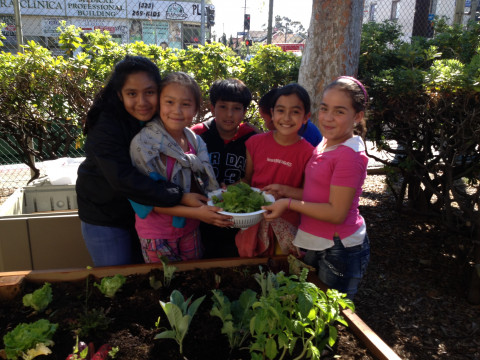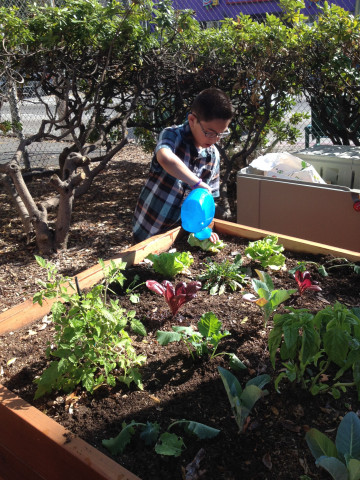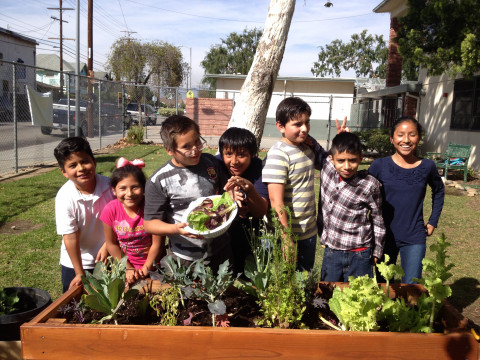Overview
Dr. Jaimie Davis received her PhD in Nutritional Sciences from UT-Austin. She is currently an Associate Professor in the Department of Nutritional Sciences. For almost two decades, she has been working with obesity-related interventions. You may be wondering, what prompted Dr. Davis to be involved in this specific field of research. As she states, "Childhood obesity is an ongoing problem- it's a 'pandemic.'" Around half of kids are classified as either overweight or obese. Kids are now developing type 2 diabetes and other metabolic diseases way earlier on in life, and what research is starting to show is when they go on to become adults, they most likely will continue to be overweight and obese, carrying over these associated health risks." As a Registered Dietitian and nutrition researcher, Dr. Davis became interested in understanding the underlying reason why so many children are overweight or obese.
Many children lack access to healthy foods and exposure to physical activity, and there are huge health disparities, especially among low income and racially ethnic diverse populations. Because nutrition and physical activity resources are not equitably available across populations, Dr. Davis wanted to design nutrition and physical activity interventions that would be accessible and readily available for all kids.
Texas Sprouts
TX Sprouts, a research project funded by the National Institutes of Health, is a garden-implemented, nutrition-based program provided within schools, offering up to 18 lessons throughout the year. The program was designed with the goal of being able to increase accessibility and availability of healthy foods, while simultaneously teaching kids how to build healthier eating habits. The results of this project have shown an increase in vegetable intake and time-on-task (the ability to focus during lessons), a reduction in lipids, and improvements in glucose control, physical activity, self-efficacy to cook and garden, and academic performance. Teaching kids how to plant and take care of seeds - harvesting the produce and preparing a meal or dish from the harvest - has led to these drastic improvements in health. By working and learning in the school gardens, kids are not only able to learn valuable lessons to take back to their homes, but they are also getting the chance to be physically active and engaged.
SproUTing Teachers
Another program that is available and has been developed by the researchers behind TX Sprouts, is called SproUTing Teachers. This program was designed in a way to set teachers up for success in their gardens by providing resources, materials, and training. Through these training sessions, teachers learn how to maintain their school gardens, how to conduct lessons in the gardens, and how to develop leadership and effective communication skills around the gardens. Results from a survey that was done with over 500 different teachers from over 100 schools, showed that successful school gardens were three times more likely to have community partner use; four times more likely to have an active garden committee, a garden-based curriculum, and teacher training around gardening; and twelve times more likely to have adequate or good administration and district support.
Future Work
In the near future, Dr. Davis plans to partner up with the organization, Brighter Bites, hoping to be able to observe the effects the produce co-op system is having on health parameters such as type II diabetes risk factors and obesity markers on kids in the schools. Additionally, she wants to work with oncologists to develop gardening and nutrition interventions for pediatric cancer survivors, a very high risk and fragile population. During treatment, these children are living very sedentary lifestyles, and they experience a lot of weight gain and changes in behavior. Dr. Davis and her team are hoping to send grow kits and cooking kits to families every week for 16 weeks and provide virtual cooking lessons to help promote healthier eating habits.
Key Takeaway
Dr. Davis's key takeaway: "Teaching children where their food comes from and how to prepare it, is key to getting them to eat it."
Check out the recent news coverage here: https://www.kvue.com/article/news/education/schools/school-gardens-hit-central-texas/269-de102dd6-afac-480c-8c34-12d8e0850052
For more information about Dr. Davis's EdEN Lab check out this link: https://www.edenut.org/












